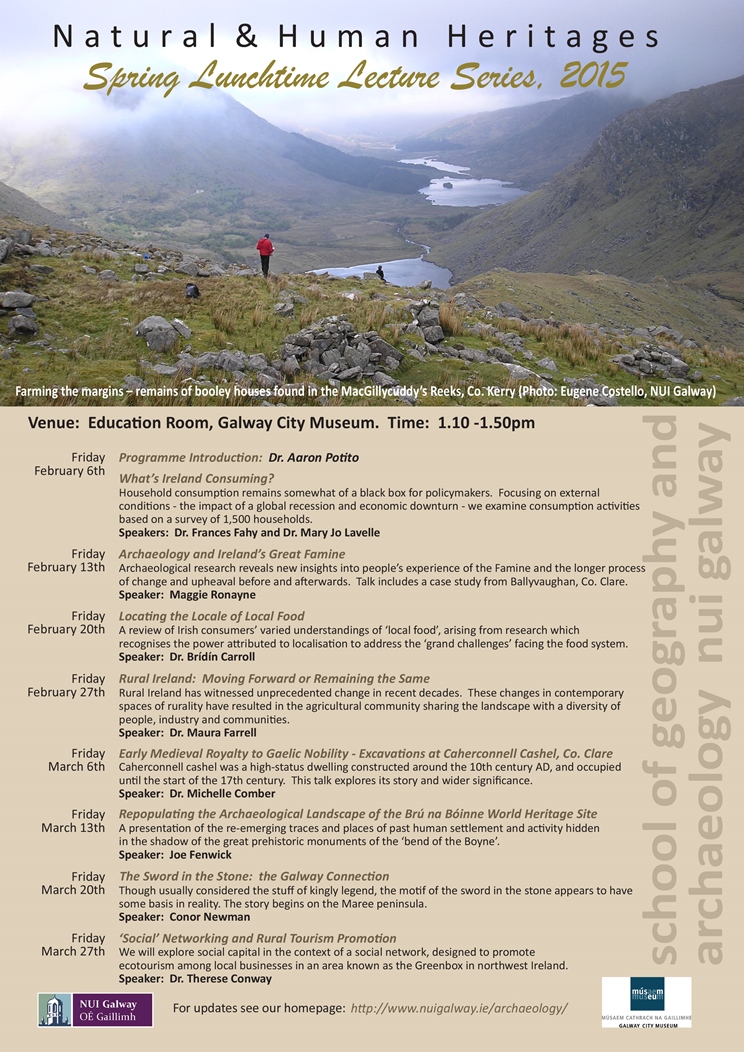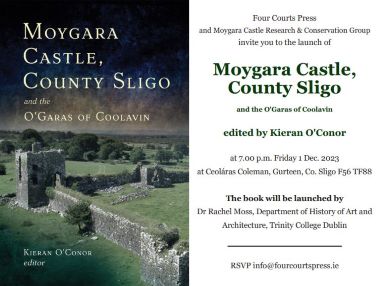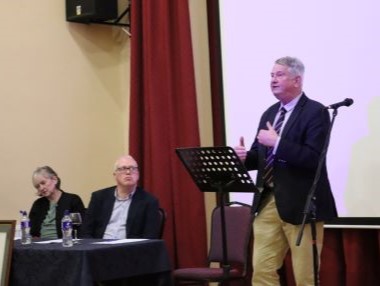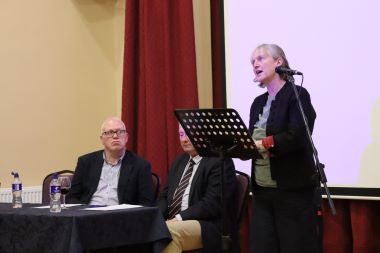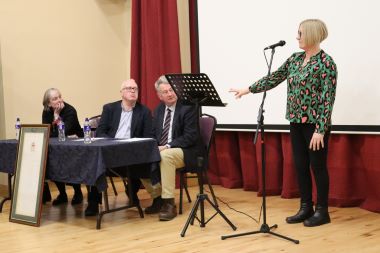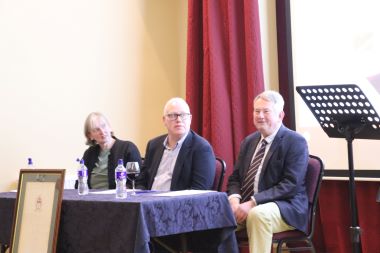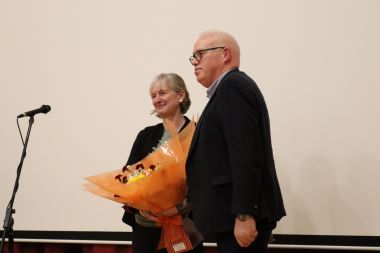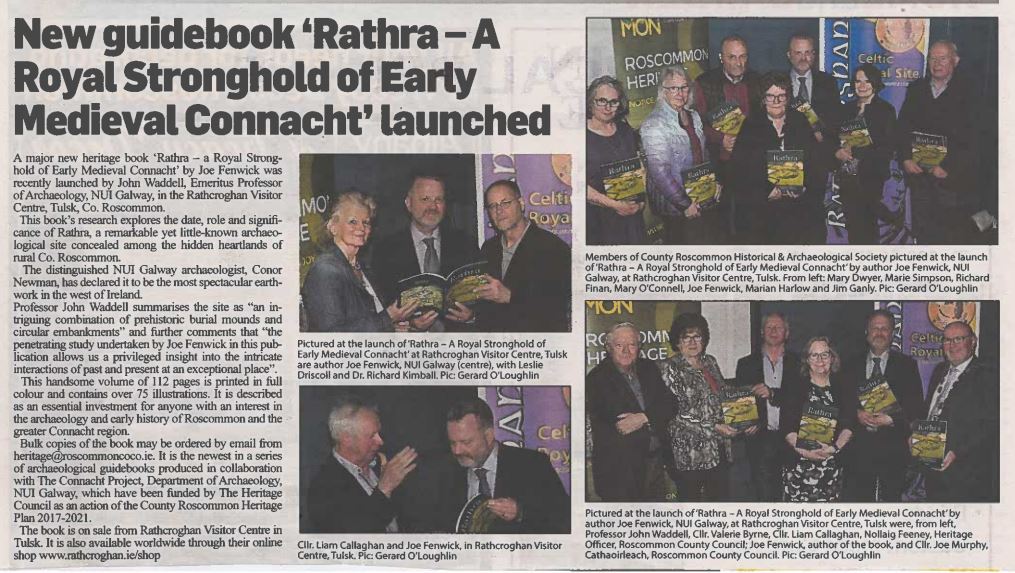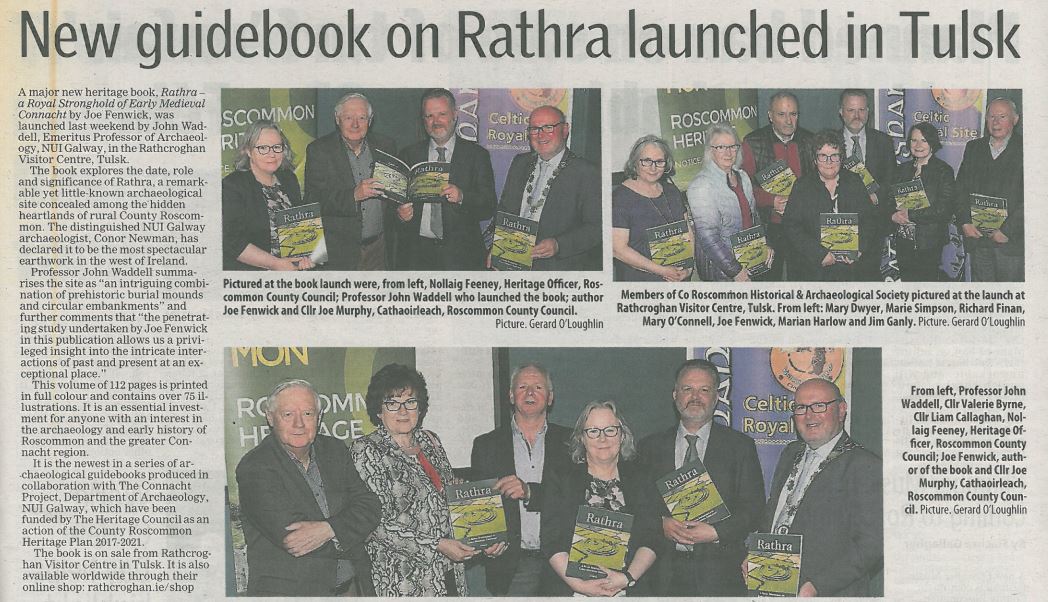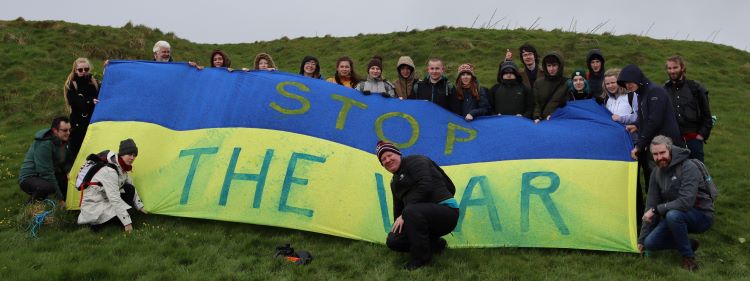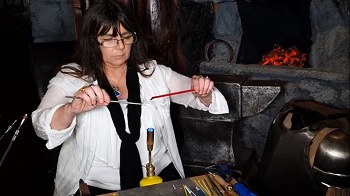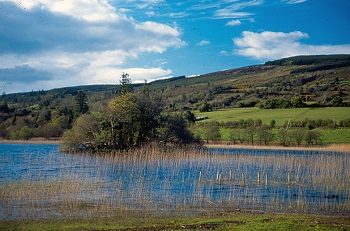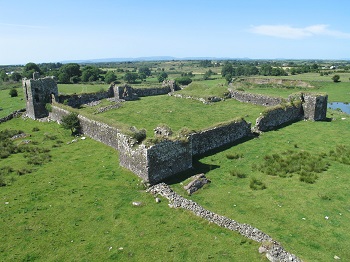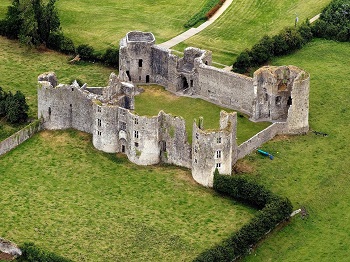-
Courses

Courses
Choosing a course is one of the most important decisions you'll ever make! View our courses and see what our students and lecturers have to say about the courses you are interested in at the links below.
-
University Life

University Life
Each year more than 4,000 choose University of Galway as their University of choice. Find out what life at University of Galway is all about here.
-
About University of Galway

About University of Galway
Since 1845, University of Galway has been sharing the highest quality teaching and research with Ireland and the world. Find out what makes our University so special – from our distinguished history to the latest news and campus developments.
-
Colleges & Schools

Colleges & Schools
University of Galway has earned international recognition as a research-led university with a commitment to top quality teaching across a range of key areas of expertise.
-
Research & Innovation

Research & Innovation
University of Galway’s vibrant research community take on some of the most pressing challenges of our times.
-
Business & Industry

Guiding Breakthrough Research at University of Galway
We explore and facilitate commercial opportunities for the research community at University of Galway, as well as facilitating industry partnership.
-
Alumni & Friends

Alumni & Friends
There are 128,000 University of Galway alumni worldwide. Stay connected to your alumni community! Join our social networks and update your details online.
-
Community Engagement

Community Engagement
At University of Galway, we believe that the best learning takes place when you apply what you learn in a real world context. That's why many of our courses include work placements or community projects.
Events
Spring Lunchtime Lecture Series 2024
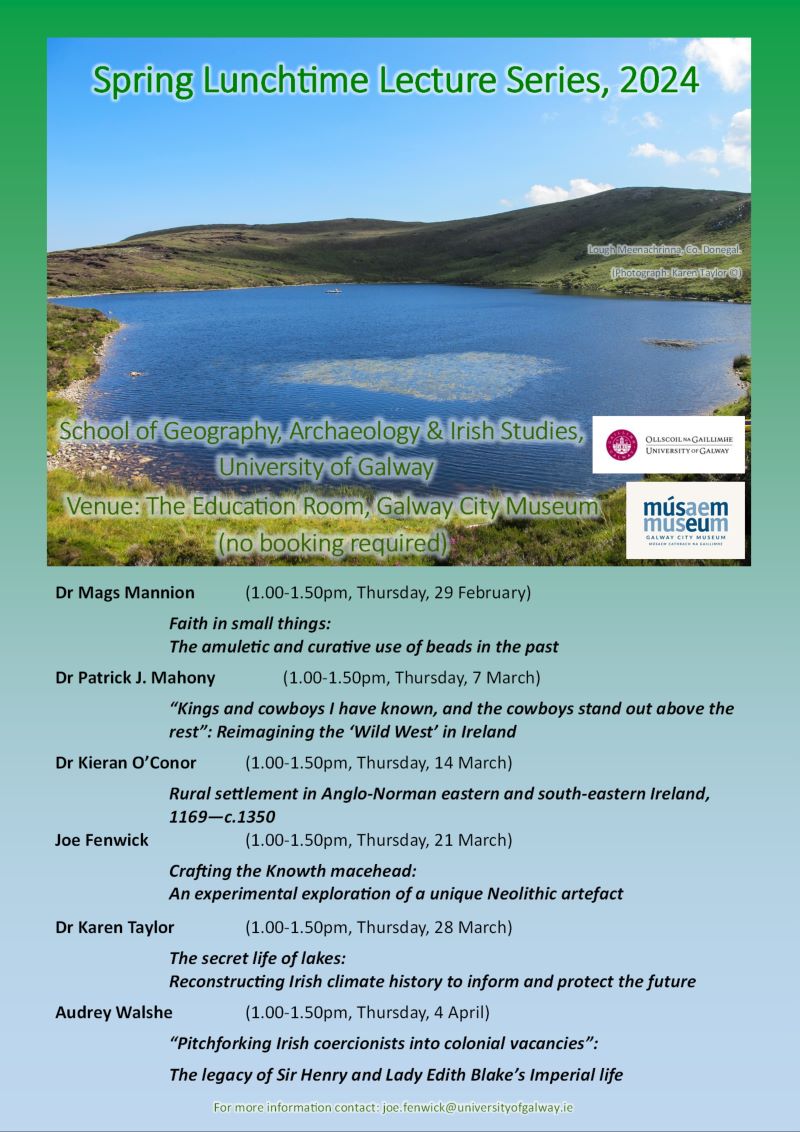
Dr Mags Mannion's glass-working talk at the NMI
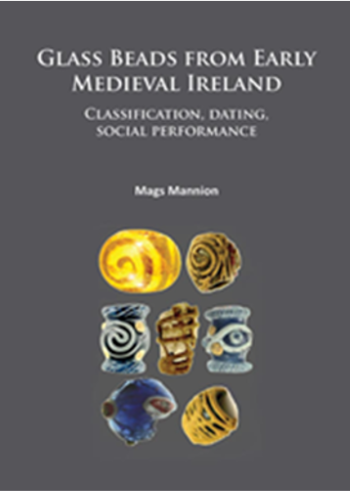 |
Dr Mags Mannion recently delivered a talk entitled 'Rediscovering Ancient Crafts: Ancient Glass Working' at the National Museum of Ireland. It has been recorded as part of the Online Video Series for the National Museum of Ireland, Kildare Street, and is available on their website. |
|---|
'Moygara Castle' book-launch
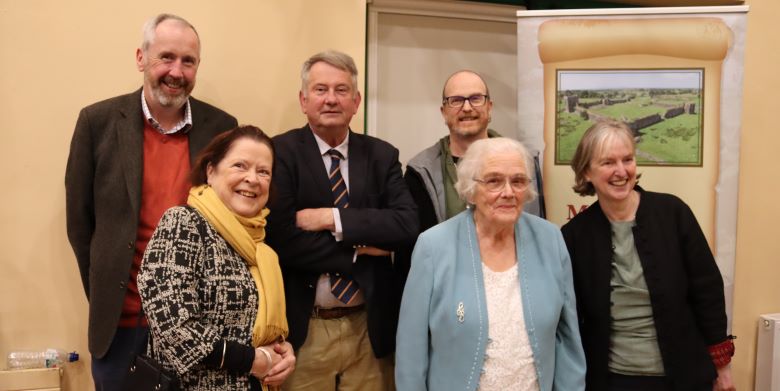
Moygara Castle, County Sligo, and the O’Garas of Coolavin (Four Courts Press), edited by Kieran O’Conor, was launched to great fanfare by Dr Rachel Moss, Department of History of Art and Architecture, Trinity College Dublin, in Ceoláras Coleman, Gurteen, Co. Sligo, on Friday, 1 December 2023. Pictured above are (L-R): Rory Sherlock, Phil Foley, Kieran O’Conor, Chris Read, Maura O’Gara O’Riordain and Rachel Moss.
|
Book-launch invitation |
Dr Rachel Moss, P.J. O'Neill & Dr Kieran O'Conor |
|
P.J. O'Neill, Dr Kieran O'Conor & Dr Rachel Moss |
Dr Rachel Moss, P.J. O'Neill, Dr Kieran O'Conor |
|
Dr Rachel Moss, P.J. O'Neill & Dr Kieran O'Conor |
P.J. O'Neill presenting Dr Rechel Moss |
Laying the foundations:
A research workshop to inform the World Heritage nomination process for The Passage Tomb Landscape of County Sligo
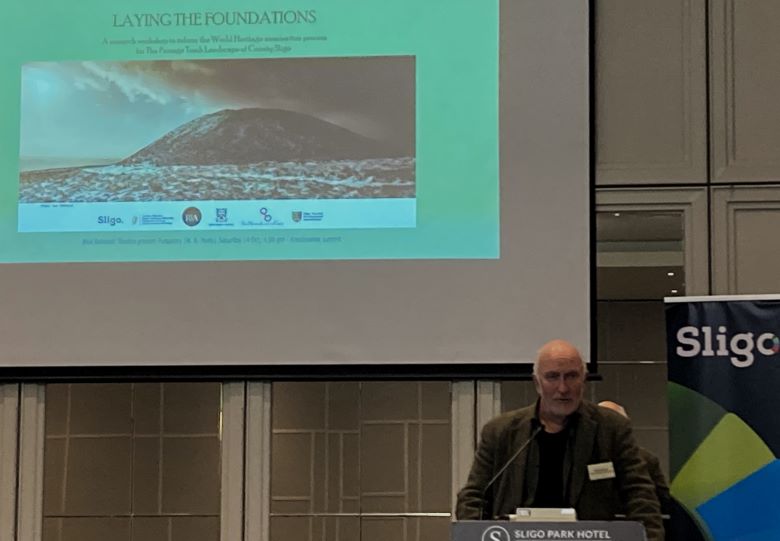
The Passage Tomb Landscape of County Sligo was successfully included on Ireland’s World Heritage Tentative List in 2022. Being on the list is the first major step towards full inscription as a World Heritage Property.
To inform the work towards full WHS status for this extraordinary group of some 100 Neolithic passage tombs, a two-day workshop was held at the Sligo Park Hotel on 13th October followed by a field-excursion to the 'landscape of the monuments' on 14th October, 2023. The workshop was organised by the Sligo Neolithic Landscapes group, with support from the Royal Irish Academy and the National Monuments Service DHLGH, Sligo County Council and Sligo Tourism Development Association.
A series of speakers, all with extensive international experience in World Heritage nomination process, where invited to present papers focused on how the current application best could be progressed (outline programme below).
Dr Stefan Bergh, Lecturer in Archaeology, and Dr Robert Hensey, Adjunct lecturer in Archaeology, both founding members of the Sligo Neolithic Landscapes group chaired two of the sessions during the day.
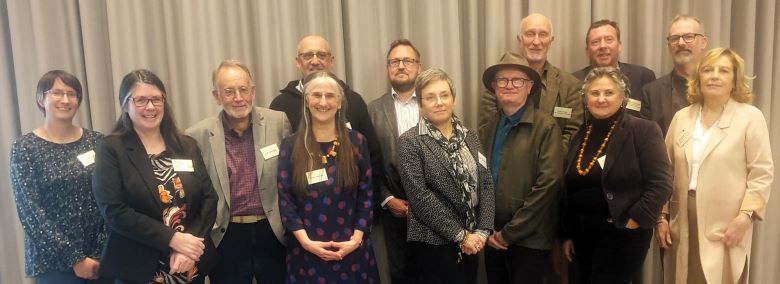 |
| Pictured (left to right): Susan Greaney, Siobhan Ryan (SCC), Chris Blandford, Leonardo Garcia Sanjuán, Alison Sheridan, Stefan Wessman, Luisa de Marco, Padraigh Meehan, Stefan Bergh, Patrizia La Piscopia, Michael McDonagh, Robert Hensey, Dorothy Clarke (SCC) (Gabriel Cooney and Jessica Smyth attended via Zoom and are absent from the group photograph). |
Laying the Foundations – A research workshop to inform the World Heritage nomination process for The Passage Tomb Landscape of County Sligo
Welcome Address by Cllr. Gerard Mullaney, Cathaoirleach, Sligo County Council.
Opening Remarks by Martin Lydon, Chief Executive, Sligo County Council.
Introduction by Pádraig Meehan, Chairperson, Sligo Neolithic Landscapes Group
SESSION 1 - Site specific research trends - definition of the archaeological resources
Chair: Dr Stefan Bergh, University of Galway
Speakers
Dr Jessica Smyth, UCD School of Archaeology
‘The role of a WHS research framework: a Brú na Bóinne retrospective’
Dr Gabriel Cooney, UCD School of Archaeology
‘The Passage Tomb landscapes of Co. Sligo: The Research Landscape’
SESSION 2 - Comparative WHS properties and other relevant sites.
Chair: Dr Robert Hensey, University of Galway
Speakers
Dr Leonardo García Sanjuán, University of Seville
‘The Comparative Study of the Sligo WHS Bid. Some Comments Based on the Antequera Experience’
Dr Susan Greaney, University of Exeter
‘Lessons from the Stonehenge and Avebury WHS: good intentions vs challenges and change’
SESSION 3 - Towards a nomination dossier - management, conservation, procedures/practicalities
Chair: Michael MacDonagh, National Monuments Service
Speakers
Chris Blandford, World Heritage UK
‘The Passage Tomb Landscapes of County Sligo – Towards a Nomination Dossier’
Dr Luisa de Marco, ICOMOS member
‘Aspects of archaeological cultural landscapes and serial properties in the World Heritage context’
Stefan Wessman, Finnish Heritage Agency
‘In the spotlight for eternity - some thoughts on nominating in the 2020’s’
Patrizia La Piscopia, World Heritage Unit, National Monuments Service
‘The Journey to Nomination Guidance Tools and Capacity Building’
Discussant
Dr Alison Sheridan, National Museum Scotland
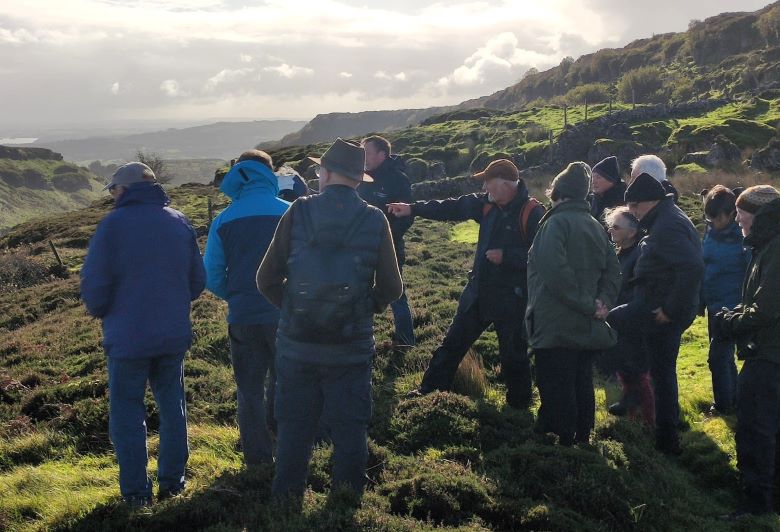 |
| Dr Stefan Bergh, Senior Lecturer in Archaeology, University of Galway, describing the landscape setting of the Carrowkeel passage tombs to the WHS Workshop group. |
As inscription/full WHS status of ‘The Passage Tomb Landscape of Sligo’ will present significant benefits, opportunities and challenges for the long-term sustainable management of heritage in County Sligo representatives from a variety of sectors in Co. Sligo and beyond were invited to attend the workshop. In attendance were people representing landowners, the farming community, hospitality industry, art and heritage groups, business community etc. In all an audience of c. 70 were present.
The workshop offered ample opportunities for extensive, and very important discussions on a wide range of topics in relation to the work that lies ahead to complete a nomination dossier for The Passage Tomb Landscapes of Co. Sligo to achieve full WHS status.
The Workshop proved to be a major step forward in relation to the work with the WHS nomination for The Passage Tomb Landscape of Co Sligo. Especially since a series of extremely important topics were highlighted by the invited speakers, which will all positively inform the progression of this important work for the heritage of Sligo and Ireland.
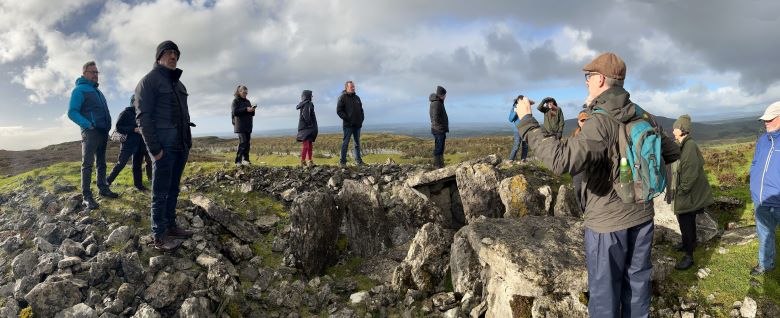 |
| Dr Robert Hensey, Adjunct Lecturer in Archaeology, University of Galway, talking to the WHS Workshop group at Carrowkeel East passage tomb. |
A new edition of 'The Prehistoric Archaeology of Ireland' launched.
A book-launch to mark the occasion of the publication of the new edition of Professor John Waddell’s The Prehistoric Archaeology of Ireland was held in the Moore Institute, College of Arts, Social Science and Celtic Studies, on Friday, 15 September, 2023.
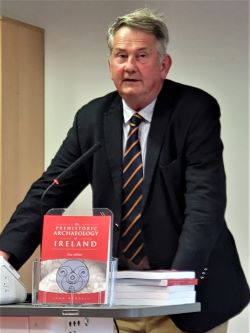 |
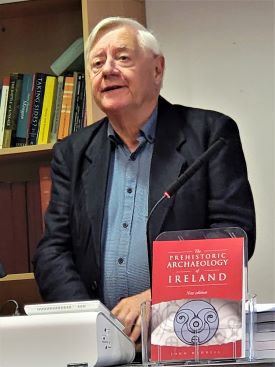 |
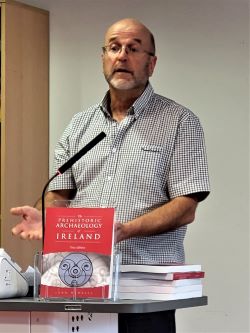 |
| Dr Kieran O'Conor | Professor John Waddell | Dr Carelton Jones |
Since the publication of the first edition of this book in 1998, and now with this new edition, The Prehistoric Archaeology of Ireland has become the core text book used in all Irish universities, north and south, for the study of Irish prehistory. In its various editions, this book is regarded by academics and students alike as the cornerstone work for the study of the development of society and the landscape on this island from at least 9,000BC to the coming of Christianity in the 5th century AD. It is a work of remarkable scholarship by one of the finest internationally recognised archaeologists currently working on these islands and across Western Europe.
RSAI Explorers' Excursion to Co. Roscommon, Summer 2023
The Royal Society of Antiquaries of Ireland (RSAI) Summer Excursion 2023, explored various notable archaeological sites in county Roscommon this year. The three-day programme was organised and led by Joe Fenwick, (Archaeological Field Officer, University of Galway/outgoing RSAI Vice President for Connacht) and Dr Kelly FitzGerald (RSAI President/School of Irish, Celtic Studies and Folklore, UCD), and was facilitated by Marysia Wieckiewicz-Carroll (RSAI Executive Officer) and Priscilla Sonnier (RSAI). It proved to a very successful field excursion and was enjoyed by all.
Tuesday, 4th July.
Roscommon Abbey
Guide: Dr Kieran O’Conor (Senior Lecturer, Archaeology, University of Galway/RSAI Vce President for Connacht)
Roscommon Abbey, a Dominican priory dedicated to the Virgin Mary, was founded in 1253 by Felim O’Conor, king of Connacht. It was a particularly important Dominican foundation, being the first of this order to have been established in a Gaelic context. Under royal patronage, it was clearly a prosperous foundation. It continued in use up until the second half of the sixteenth century, at which time it was confiscated by the Crown as part the Reformation process. Although ruinous, the priory church remains standing and the surviving architectural details clearly demonstrate that this was once a particularly impressive and lavishly decorated building. Much of the fabric of this thirteenth-century structure remains, but the building also saw considerable modification in the fifteenth-century, at which stage the magnificent tracery window was inserted in its western gable. The foundations of the adjoining claustral buildings were identified through geophysical survey to the south. The tomb of Felim O’Conor contains particularly fine examples of medieval carving, which are considered to be amongst the finest surviving medieval stone carving in Connacht today.
Further reading:
O’Conor, K. & Shanahan, B. 2013 Roscommon Abbey: a visitor’s guide. Roscommon, Roscommon County Council.
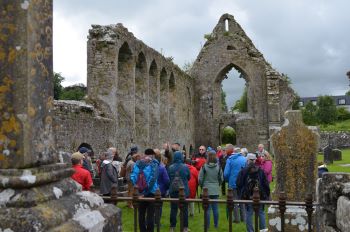 |
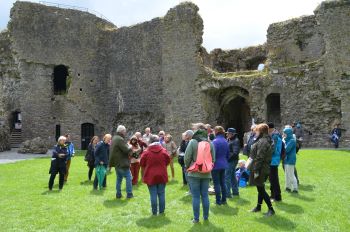 |
Roscommon Castle
Guide: Dr Kieran O’Conor (Senior Lecturer, Archaeology, University of Galway/RSAI Vice President for Connacht)
Roscommon Castle, a particularly fine example of Anglo-Norman fortification in Ireland, commenced construction in 1269 at the instigation of the Justiciar (King Henry III’s chief governor in Ireland) as a royal castle and, despite its turbulent history, remained occupied until the late seventeenth century. Its early architectural details bears close similarity to the great Edwardian castles of North Wales, especially Harlech Castle, which also dates to the thirteenth century and was also built under royal command. It was captured by the local Irish in the fourteenth century and functioned as an O’Conor fortress for almost two hundred years. The castle was largely rebuilt in the Renaissance style in the late sixteenth century by Sir Nicholas Malby, an English administrator, at which time it was converted into one of the largest fortified houses of its day. Considerable portions of the late thirteenth-century castle and also the late sixteenth-century insertions, although in ruinous condition, survive to this day.
Further reading:
O’Conor, K. & Murphy, M. 2008 Roscommon Castle: a visitor’s guide. Roscommon, Roscommon County Council.
Wednesday, 5th July.
The ‘royal’ site of Rathcroghan/Rathcroghan Visitor Centre.
Guides: Joe Fenwick, Archaeological Field Officer, University of Galway, & Dr Daniel Curley, Manager, Rathcroghan Visitor Centre.
Rathcroghan, ancient Crúachu, served as the Late Prehistoric ‘royal’ site for the provence of Connacht. Its ritual landscape extends over six square kilometres, encompassing some 240 individual archaeological sites and monuments. These date from as early as the Neolithic period but the majority can be attributed to later prehistoric times and consist predominantly of ritual sites and burial monuments, many of which are of unusual type, scale or morphology. At its heart lies Rathcroghan mound, the focal monument of the greater ritual complex.
Rathcroghan also features prominently in the literary imagination of early medieval Ireland as a great royal residence, a distinguished cemetery and place of regional assembly; a fading memory of an heroic pagan past, which by this time had been eclipsed by the thriving ecclesiastical centres of the early Church – or so we are led to believe.
Further Reading:
Curley, D. & McCarthy, M. 2023 (2nd edition) Rathcroghan: the guidebook. Roscommon, Tulsk Action Group.
Fenwick, J.P. 2018 A comparative archaeological review of the late prehistoric ‘royal site’ of Rathcroghan. In R. Farrell, K. O’Conor & M. Potter (eds) Roscommon: History and Society. Interdisciplinary essays on the history of an Irish county. 63-86. Dublin, Geography Publications.
Waddell, J., Fenwick, J. & Barton, K. 2009 Rathcroghan: archaeological and geophysical survey in a ritual landscape. Dublin, Wordwell.
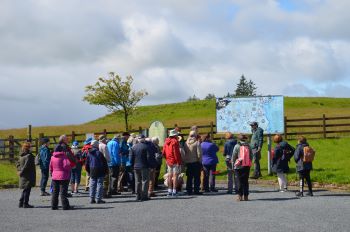 |
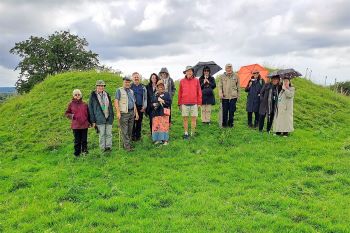 |
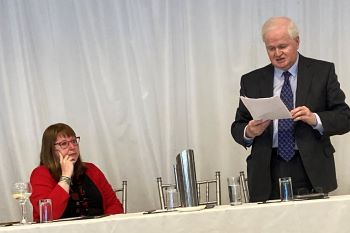 |
Evening talk: County Roscommon Historical Shane Lynskey, President, CRHAS. |
Rathra multivallate enclosure
Guide: Joe Fenwick, Archaeological Field Officer, University of Galway.
Rathra, arguably one of the finest earthworks in Connacht, is an impressively large and well preserved multivallate enclosure. It is situated on the sloping hillside of Mullaghadooey, 5km to the east-southeast of Castlerea. It averages some 150m in maximum external dimension, enclosing two internal mounds and a possible souterrain. Based on comparative archaeological evidence it is likely to have been built and occupied during early medieval period to serve as a royal stronghold, a judicial and administrative centre and possibly a place of royal inauguration. If this is the case, it very possibly the seat of the Ciarraige Aí, a powerful sept that dominated the political arena of central Connacht during the opening centuries of the early medieval period, sometime prior to the 5th century and up until the 8th centuries AD. This was a time when Christianity was making its first tentative steps towards establishing itself as the dominant religion on the island and it is perhaps no coincidence, therefore, that the important early Christian foundation of Baslick is situated just 3km to its north.
Further reading:
Fenwick, J. 2021 Rathra: a royal stronghold of early medieval Connacht. Roscommon, Roscommon County Council.
Thursday, 6 July.
The carved memorials of Ballintober graveyard
Guide: Mary Timoney, Local Historian/Archaeologist, Keash, Co. Sligo.
The richness of the grave memorials at Ballintober give an indication the status of those buried in its graveyard, but also reflect the importance of the stonemasons who made them. The Ballintober memorials can be compared with not just those in adjoining parishes but also with those in other Roscommon graveyards and further afield. Memorial design, therefore, was not confined by county boundaries. One set of designs found at Ballintober can be traced to east Galway, another to Co. Longford, while a third can be sourced in Co. Kilkenny. The work of over a hundred stone carvers have been identified in Co. Roscommon, over seventy by their initials or signature. Various members of the Kain stonemason family, for example, have work in Ballintober graveyard, dating from the 1770s to the 1840s. A mason named Simpson, who was in the area for only a short period during the 1770s, also has work here, as well as in some other nearby parish graveyards.
Further reading:
Timoney, M.B. 2018 Ballintober old graveyard: and the grave memorials of Co. Roscommon. Roscommon. Roscommon County Council.
Timoney, M.B. 2005 Had me made: a study of the grave memorials of Co. Sligo from c. 1650 to the present. Keask, TASKS.
Timoney, M.B. (forthcoming) The graveyard and memorials of Kilmeane, Co. Roscommon. Roscommon, Roscommon County Council.
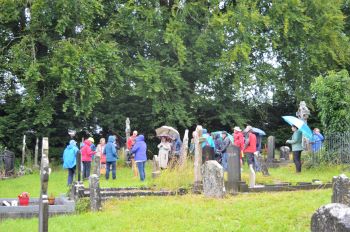 |
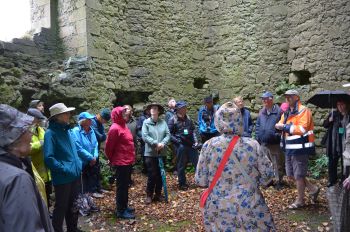 |
Ballintober Castle
Guide: Dr Niall Brady, Castles in Communities/Archaeological Diving Company (ADCO).
Ballintober Castle in another example of a ‘Keepless Castle’, but unlike Roscommon Castle, it was not built using the royal purse. The accounts relating to its construction do not survive and the best written document on the castle is the Inquistions Port Mortem of 1333. It records that castle and manor of Ballintober are among the possessions of the Richard De Burgh, the Red Earl of Ulster. The first reference to the castle being in Gaelic possession occurs in 1362, when Cathal Og and the son of Felim O’Conor, Aedh, king of Connacht seized Ballintober and went on to make a great hosting into Meath. In 1381, Rory O’Conor, king of Connacht, belonging to a proto-O’Conor Don line, plundered O’Conor Roe and took back Ballintober. The castle remained in O’Conor hands and following the split into the Rua and Don lines in 1381, it is regarded as the caput of the O’Conor Don, and is occupied continuously until abandoned for Clonalis House in early 1700s. Charles O’Conor Don, while President of our Society, published the first study of the castle in 1899 in our Journal, volume 9.
Current interest in the castle started in 2008 with Ballintober Action Group applied to the Heritage Council for a grant to conduct geophysical survey, which identified numerous features within the open interior of the ‘keepless’ castle. The interest for Castles in Communities is to help expand the insights within the context of working as a research project within the community.
Excavation combined with a wide array of survey has not only begun to reveal a complex chronology of building within the castle, but has also revealed the presence of a wider settlement area, which we can now confirm to be the Deserted Medieval Village or, more accurately, the Contracted Medieval Settlement area of Ballintober.
Further reading:
https://sites.google.com/view/irelandcastlesincommunities/home
Brady, N., Connell, S., Maurer, K., Cearley, D., Gifford, C. & González, A.L. 2018 Castles in communities. Archaeology Ireland 32(4), 17-22.
Rediscover ancient crafts at the NMI with Dr Mags Mannion
"Rediscovering ancient crafts with Mags Mannion"
11.30 am, Wednesday, 21 June 2023, Drop-in Event at the National Musuem of Ireland, Kildare Street, Dublin 2 (no booking required).
During this drop-in event, Mags will be talking about the types of glass beads worn in Early Medieval and Viking Age Ireland, and the materials, tools and skills needed to create them. Mags will have a selection of replica beads based on those found during excavations at Irish sites which demonstrate the styles and decoration of the artefacts.
Dr Mags Mannion is an experimental archaeologist and glass specialist and teaches in the University of Galway. As a glass bead artist, Mags gives traditional bead making talks and demonstrations at a number of Heritage Week events each year.
No booking required. This event will take place in the Learning Resource Room, first floor. This event is not wheelchair accessible.
Spring Lunchtime Lecture Programme 2023
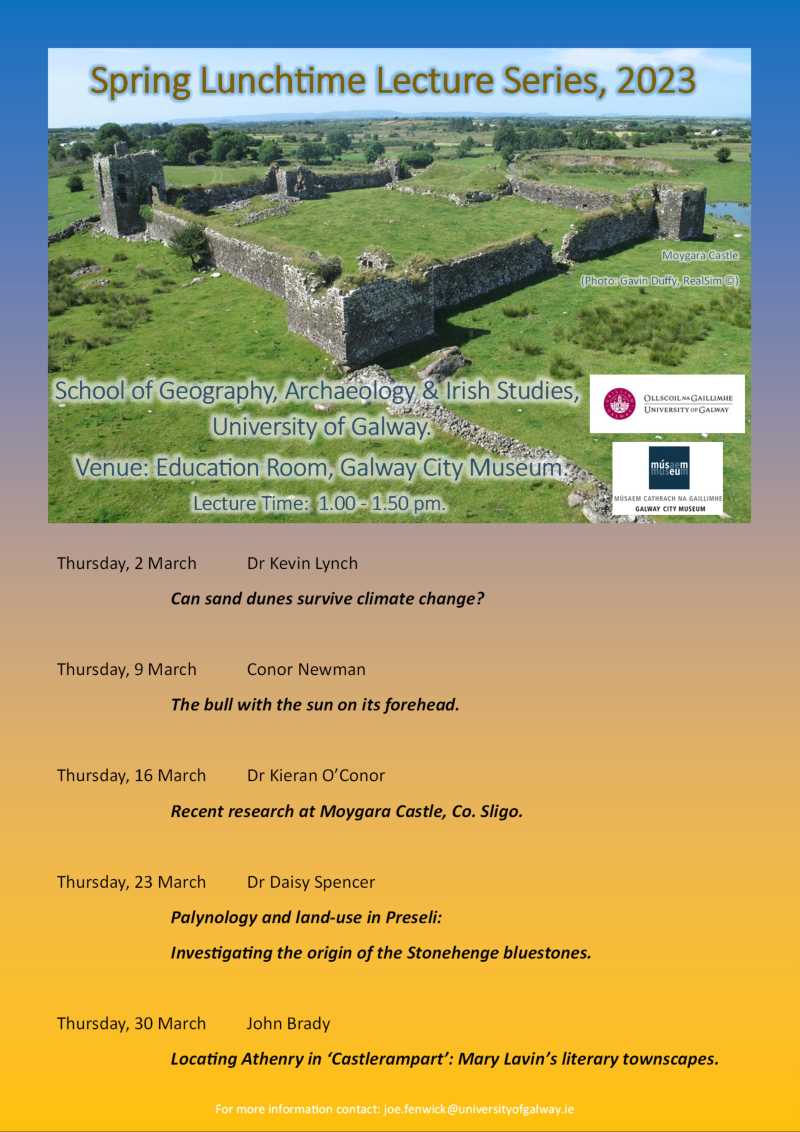
Lecture delivered by Lucia Gdovinova
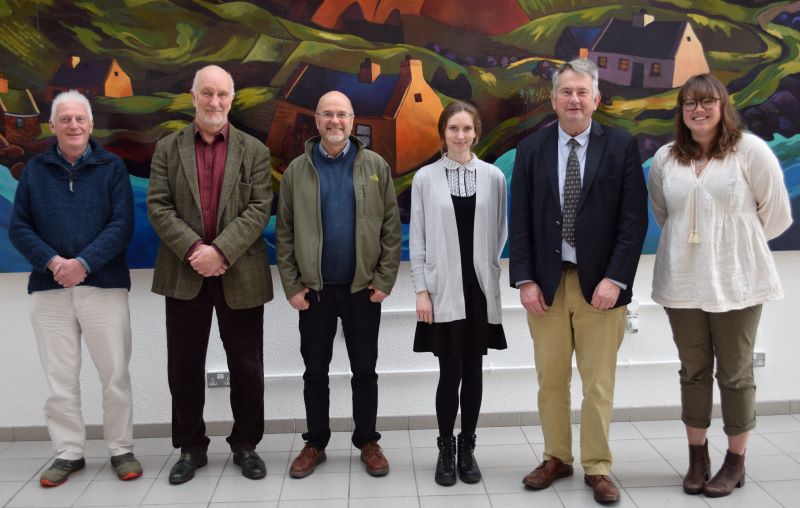
Lucia Gdovinova, PhD candidate, Charles University, Prague, on a successful Erasmus exchange with the University of Galway, gave a fascinating lecture on the subject of ‘The Neolithic in Slovakia’ to both staff and students of the School of Geography, Archaeology & Irish Studies on Wednesday 29 November 2022. Lucia, centre-right, is pictured here (L-R) with Hugh Gallagher (MA candidate, Archaeology), Dr Stefan Bergh, Dr Carleton Jones, Dr Kieran O’Conor and Kylie Crowder (PhD candidate, Archaeology).
Visit by distinguished Archaeologists from Charles University, Prague.
Staff and students of Archaeology, School of Geography, Archaeology & Irish Studies, were delighted to welcome distinguished adademic colleagues, Dr Ivo Stefan and Dr Tomas Klir, from the Department of Archaeology, Charles University - Univerzita Karlova, Prague, to the University of Galway (October 2022).
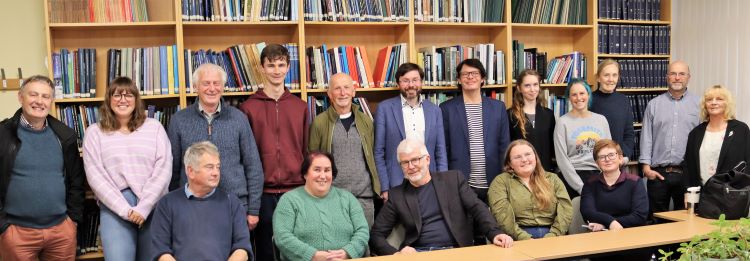 |
|
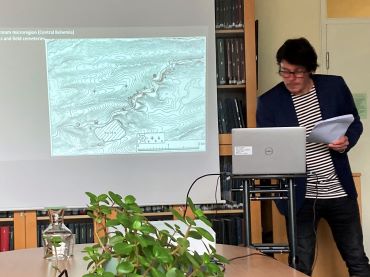 |
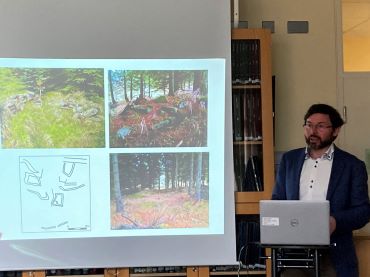 |
During their visit, Dr Stefan (bottom left) gave a lecture on the subject of ‘Bringing Christianity to Central Europe: Historical and Archaeological Prespectives’ and Dr Klir (bottom right) a lecture on ‘Deserted Medieval Villages in Bohemia: The Current State of Research’.
Events for 'National Heritage Week' 2022
Ardcarne, Co. Roscommon.
Lecture by: Dr Kieran O'Conor
Title: 'The History and Archaeology of Ardcarne Parish'
Venue: Ardcarne Church-of-Ireland Parish Church
Date: Saturday 13th August
Time: 8pm
Links to Moygara Castle Heritage Week webpage and YouTube video:
Moygara Castle, County Sligo. | National Heritage Week 13 – 21 August 2022
(29) Moygara Castle, Co. Sligo - YouTube
Online event: 'Caherconnell International Furnace Festival 2022'
Talk by: Dr Michelle Comber
Title: 'Caherconnell Cashel, Co. Clare - rulers, farmers, metalworkers, and so much more!'
Date: Sunday 21st August
Time: 2.30pm.
More info at:
https://www.furnacefestival.ie
https://www.facebook.com/caherconnellfurnacefestival/
Hill of Tara, Co. Meath.
Event: A guided walk and evening lecture to mark 30 years of research at Tara, initiated by the launch of the Discovery Programme’s Tara Project in early 1992.
Tour and evening lecture by: Conor Newman, Dr Edel Bhreathnach, Joe Fenwick & John O'Keeffe
Date: Friday, 26th August
the guided walk with commence at 3.00pm and conclude around 4.30pm (meet at St Patrick's church on the Hill)
the evening lecture will commence at 7.00pm in St Patrick's Church
'Rathra' book-launch
A major new heritage book Rathra – a Royal Stronghold of Early Medieval Connacht by Joe Fenwick was launched by John Waddell, Emeritus Professor of Archaeology, NUI Galway, in the Rathcroghan Visitor Centre, Tulsk, Co. Roscommon on Friday 22 April 2022.
The book explores the date, role and significance of Rathra, a remarkable yet little-known archaeological site concealed among the hidden heartlands of rural county Roscommon. The book runs to 112 pages, is printed in full colour and contains over 75 illustrations. It is essential reading for anyone with an interest in the archaeology and early history of Roscommon and the greater Connacht region.
It is the newest in a series of archaeological guidebooks produced as part of The Connacht Project, Department of Archaeology, NUI Galway, in collaboraton with Roscommon County Council and generously funded by The Heritage Council as an action of the County Roscommon Heritage Plan 2017-2021.
The book is on sale from Rathcroghan Visitor Centre in Tulsk. It is also available worldwide through their online shop www.rathcroghan.ie/shop. Bulk copies of the book may be ordered by email from heritage@roscommoncoco.ie.
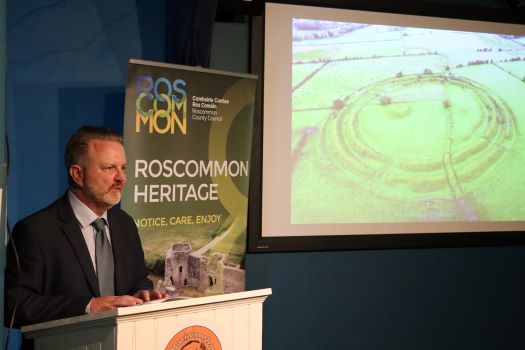 |
Joe Fenwick Rathra: |
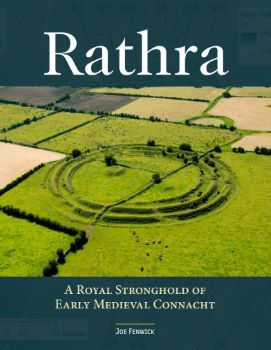 |
|
The Roscommon People newspaper (26 April 2022) |
|
The Roscommon Herald newspaper (26 April 2022) |
Humanitarian Fundraiser for Ukraine
A huge thank-you to all the students and staff who organised, supported and contributed so generously to the book exchange and coffee morning in aid of Ukrainian refugees fleeing their country in the face of the Russian invasion. €1,423.10 was raised on the day (Tuesday, 8 March 2022) all of which was donated to Unicef Ireland who are dealing directly with the unfolding human tragedy where most needed.
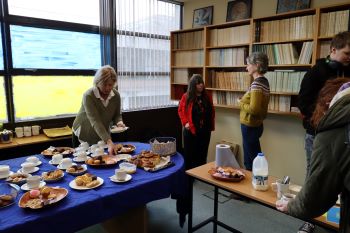 |
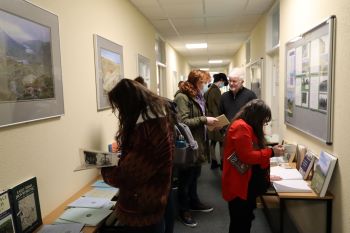 |
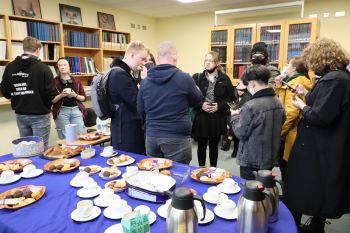 |
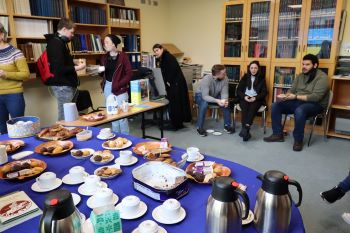 |
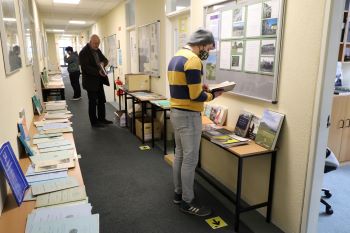 |
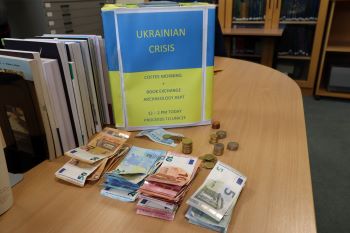 |
|
Unfurling the 'Stop the War' Ukranian flag during a field-class to Rathcroghan, Co. Roscommon on Wednedsday 6 April 2022 |
|
Spring Lunchtime Lecture Series, 2022 (via Zoom)
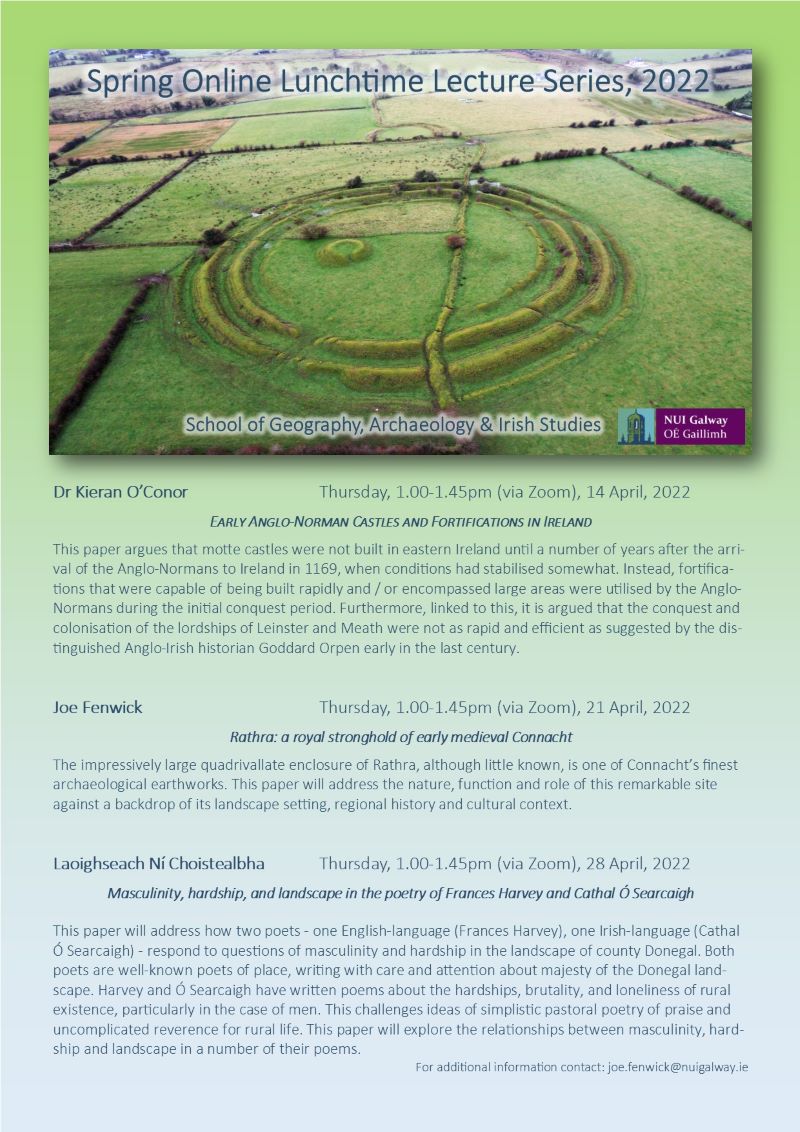
To make a booking to attend any or all of these events via Zoom please email joe.fenwick@nuigalway.ie in advance.
Our Heritage Week Events for 2021
Three Castles in the Midlands
Dr. Kieran O’Conor will explore the history of three castles in the Midlands. Athlone, Rindoon and Roscommon were once considered as royal fortresses guarding the line of the Shannon. Dr. O'Conor will look at their importance as medieval structures and will give us an insight as to why they were once considered amongst the most important royal buildings in Ireland in the late 13th and early 14th centuries.
Kieran’s talk will be hosted by Athlone Castle via Zoom.
This virtual talk is free, but pre-booking is essential as spaces are limited.
The recording of this talk will afterwards be available on Athlone Castle’s social channels.(see: https://www.heritageweek.ie/projects/three-royal-castles-athlone-rindoon-and-roscommon-by-kieran-oconor)
Rathra: a royal stronghold of early medieval Connacht
Roscommon County Council is proud to work in collaboration with Joe Fenwick of NUI Galway on the next publication in our ongoing series of archaeology guidebooks. 'Rathra: a royal stronghold of early medieval Connacht' by Joe Fenwick will explore the date, role and significance of this spectacular multivallate earthwork, a little-known archaeological site concealed among the hidden heartlands of rural Co. Roscommon.
Final preparations for the new book have included commissioning photography and drone footage by Pedro Teixeira. A conjectural reconstruction drawing of Rathra has been commissioned from Uto Hogerzeil and you can see it in the 'Drawing on our Heritage' digital exhibition listed elsewhere on www.heritageweek.ie.
This project is supported by the Heritage Council and we look forward to launching this publication in the coming months.
(see: https://www.heritageweek.ie/projects/rathra-a-royal-stronghold-of-early-medieval-connacht)
Magic of Culture & Nature in the Uí Maine Kingdom, Co. Roscommon.
Daniel Curley, PhD candidate (Archaeology) will contribute
"A brief introduction to the prehistoric and medieval heritage of Magh Finn and Clann Uadach (Taughmaconnell, Dysart and Cam parishes, Co. Roscommon)" as part of Magic of Culture & Nature in the Uí Maine Kingdom | National Heritage Week 14-22 August 2021
Guided farm walk of the Mucklaghs in the Rathcroghan Archaeological Complex, Co. Roscommon.
Daniel Curley, PhD candidate (Archaeology) and manager of the Rathcroghan Visitor Centre and Petra Kock-Applegren, Farming Rathcroghan EIP-Argi Project Manager, will be leading a guided archaeologial tour on Saturday 21 August as part of a Guided farm walk of the Mucklaghs in the Rathcroghan Archaeological Complex | National Heritage Week 14-22 August 2021
Corcomroe Tour, Burren, Co. Clare.
Silvina Martin, PhD candidate (Archaeology) will be giving a guided tour of Corcomroe Abbey in the Burren of county Clare. Meet her at the abbey gate at 11.30am, Sunday, 22 August.
Lunchtime Lecture Series 2021 (via Zoom)
The School of Geography, Archaeology and Irish Studies, NUI Galway will continue its successful programme of annual public lectures this coming Spring, 2021. The theme of these lectures explores the relationship between Archaeology, Geography, Irish studies and the natural world and aims to showcase the diverse areas of study within the three disciplines.
This year’s programme of 9 lectures offers a particularly interesting line up on a varied and engaging range of subject matter. From climate change adaption to Irish traditional soundscapes, and from precious metalworking to moated sites.
Lectures commence on Thursday, February 4th at 1.00pm and continue weekly until and including Thursday, April 1st. Due to Covid-19 restrictions these lectures will take place online via Zoom and like previous years are free to attend. If you would like to join some or all of these lectures, please see the attached poster with the full programme. Prior to each talk, a link to the event will be posted on our Facebook page.
Note: the programme may change at short notice so please check out our website and Facebook page for any updates: http://www.nuigalway.ie/archaeology/
We look forward to your participation.
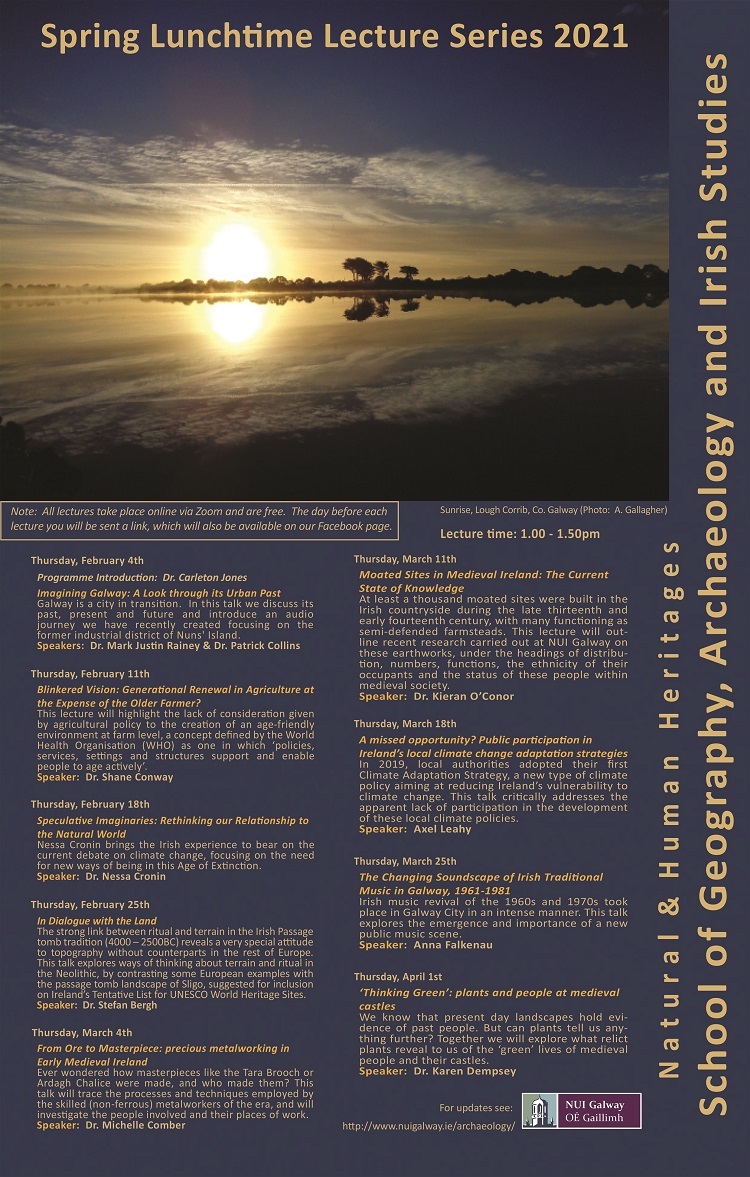
Heritage Week 2020 events
|
|
As part ofLoughrea Virtual Medieval Festival 2020Dr Mags Mannion,archaeologist and glass bead expert,presents an introduction to the craft ofancient glass bead making (click here) |
During Heritage Week 2020Dr Kieran O’Conor is givingfive on-line talks on variousaspects of medieval archaeologyin Counties Leitrim, Longford,Roscommon and Sligo.He will also lead a walking tour ofKeadue (all details below). |
|
|
|
|
The titles of these talks are:
- ‘Medieval Settlement in Leitrim during the Anglo-Norman Period’,
- ‘The Anglo-Normans in Co. Longford’,
- ‘A guided tour of Roscommon Abbey’,
- ‘A guided tour of Roscommon Castle’ and
- ‘Moygara Castle’.
The Heritage Officers in all the latter counties organised these talks, realising that they had to be online because of social distancing rules linked to Covid 19, and provided the funding for what amounted to about a week of filming in all. Some of these talks have yet to be uploaded to the Heritage Week website but these will be on-line shortly (see: https://www.heritageweek.ie/ ).
Keadue heritage walking tour - 19th August
To celebrate Heritage Week, Keadue Community in cooperation with Creative Ireland Programme has organised a guided tour of local Heritage sites conducted by Dr. Kieran O'Conor, NUI Galway.
Assemble at Knockranny Wood car park at 6.30pm on Wednesday August 19th.
Most famous among the sites is Kilronan Abbey which contains within its walls the remains of the famous Poet, Harper, and Composer, Turlough O'Carolan. The year 2020 is particularly significant because it marks the 350th anniversary of his birth. A cermony will take place in the Abbey to mark the occasion.
Please note: Due Covid-19 restrictions social distancing to be observed at all times.
Enquiries to info@keadue.net
Spring Lunchtime Lecture Series, 2020
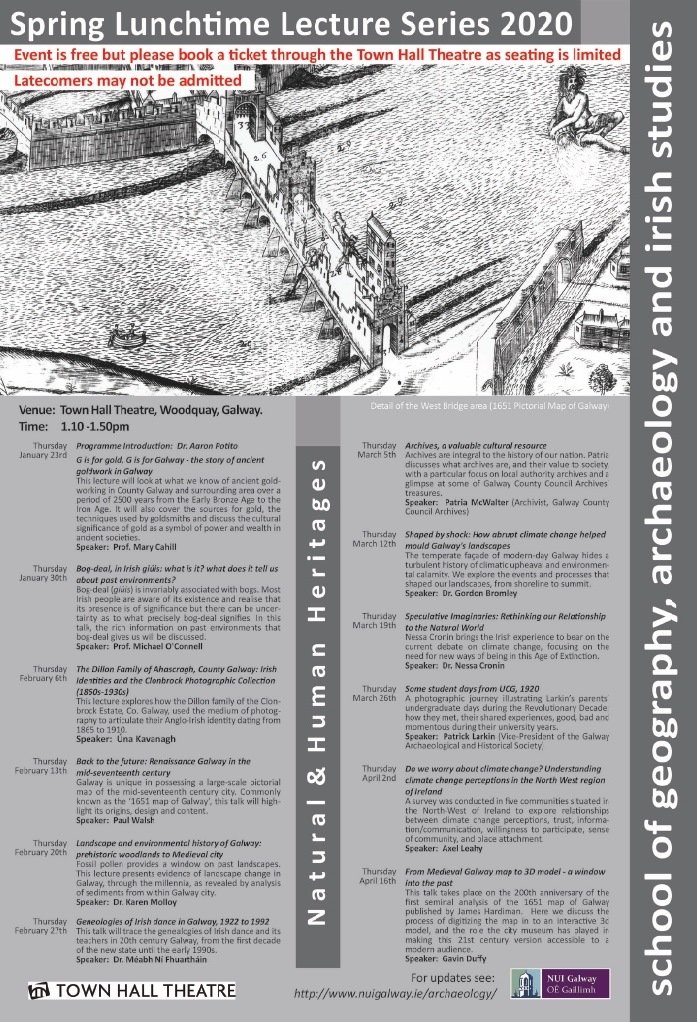
Save a pdf copy of the poster by clicking here: Spring Lunchtime Lecture Series (poster) 2020
Dr Kieran O'Conor: upcoming lectures in Chicago and Moate, Sept. 2019
Dr Kieran O'Conor will be spending the week of Sunday 8th September to Friday 13th September in the Chicago area, USA, promoting NUI Galway as a destination for visiting students.
While there, he will be giving a lecture on the subject of medieval settlement in north Roscommon and west Breifne to the Department of Anthropology, Notre Dame University in South Bend, Indiana and another lecture on Irish castles to the Department of Anthropology, University of Illinois at Chicago, in downtown Chicago.
The following Monday (16th September), and a little nearer to home, Dr O'Conor will present the Annual Jeremiah Sheehan Memorial Lecture to the Moate Museum and Historical Society in the Grand hotel, Moate, Co. Westmeath. The title of the lecture is 'Motte Castles in Medieval Ireland'.
'Roscommon History and Society' book launch: 12 December 2018
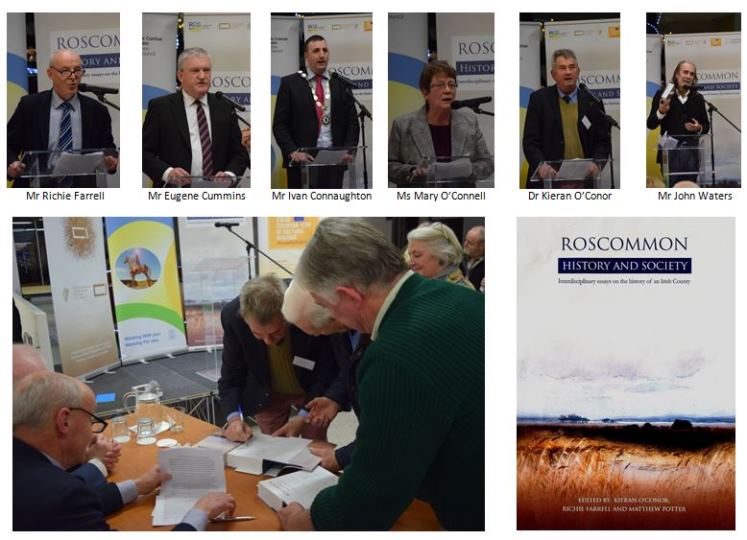
Roscommon: History and Society, edited by Richie Farrell, Kieran O’Conor and Matthew Potter, was officially launched by Mr John Waters, Irish Times journalist, author and playwright, in the new Roscommon County Council offices in Roscommon town on Wednesday evening 12 December 2018.
Also speaking at the launch were; Mr Richie Farrell, Roscommon County Librarian (retired); Eugene Cummins, CEO, Roscommon County Council; Mr Ivan Connaughton, Cathaoirleach, Roscommon County Council; Ms Mary O’Connell, President, Roscommon Archaeological and Historical Society and Dr Kieran O’Conor, Department of Archaeology, NUI Galway.
'Roscommon: history and Society' is the twenty-sixth volume in the History and Society series published by Geography Publications under the general editorship of Professor William Nolan. It runs to 920 pages and contains 202 illustrations. It consists of 35 chapters, several of which deal with the rich archaeological heritage of county Roscommon, written by 37 authors, a third of whom, we are proud to say, are employees, retired employees or graduates of NUI Galway.
Spring Lunchtime Lecture Series 2019
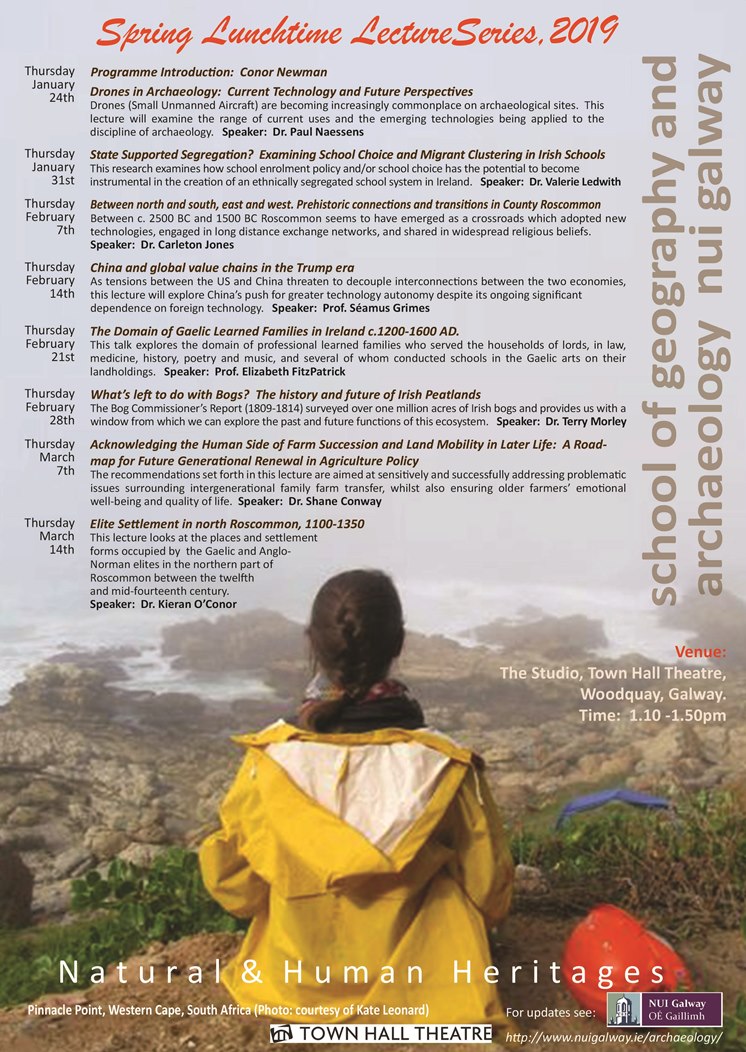
.
Book Launch: 'Colomban et son Influence'
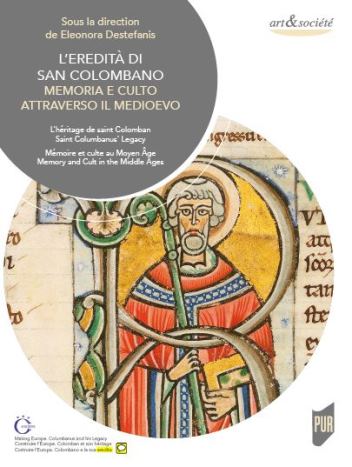 |
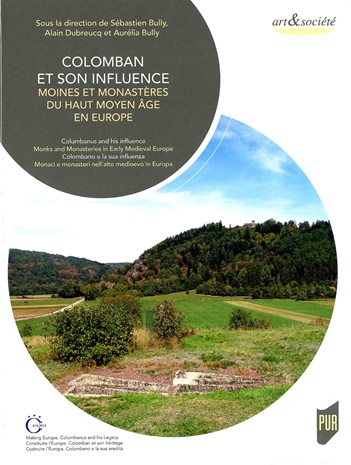 |
| Volume 1, 2017 | Volume 2, 2018 |
The second of three volumes of proceedings from the 2015 conference series organised by the international project Making Europe: Columbanus and his Legacy will be launched in Luxeuil-les-Bains, France, on 23rd November 2018. The series marked the 1400th anniversary of the death of Columbanus in Bobbio, Italy, in AD 615. The project arose form a Moore Institute project Columbanus; Life and Legacy co-founded and co-directed by Conor Newman (Archaeology, NUI Galway) and Mark Stansbury (Classics, NUI Galway). The proceedings are published by Rennes University Press and the final volume of proceedings from the conference held in Bangor, Co. Down, are in preparation.
'Lost and Found III' book launch: 2 December 2018
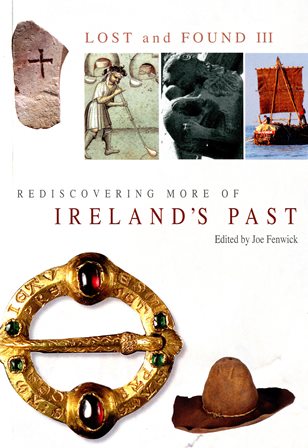 |
The directors of Wordwell Ltd Lost and Found III: rediscovering more of Ireland's past edited by Joe Fenwick (Archaeology, NUI Galway) |
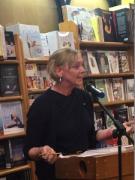 |
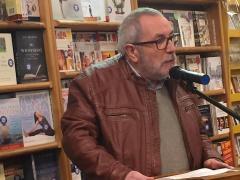 |
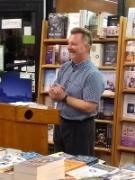 |
| Eithne Verling, Director of Galway City Museum. | Nick Maxwell, Publisher, Wordwell Ltd. | Joe Fenwick, Archaeology, NUI Galway |
Laser-scanning and Photogrammetry Workshop: Wednesday 4th July 2018
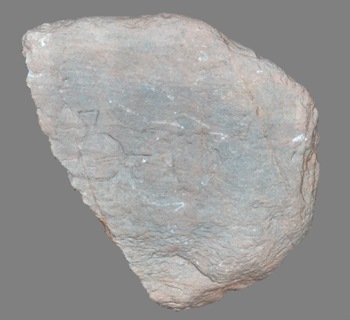 |
There will be a ‘Laser-scanning and Photogrammetry Workshop’ This initiative is hosted by the Discipline of Archaeology, All welcome! |
Spring Lunchtime Lecture Series 2018
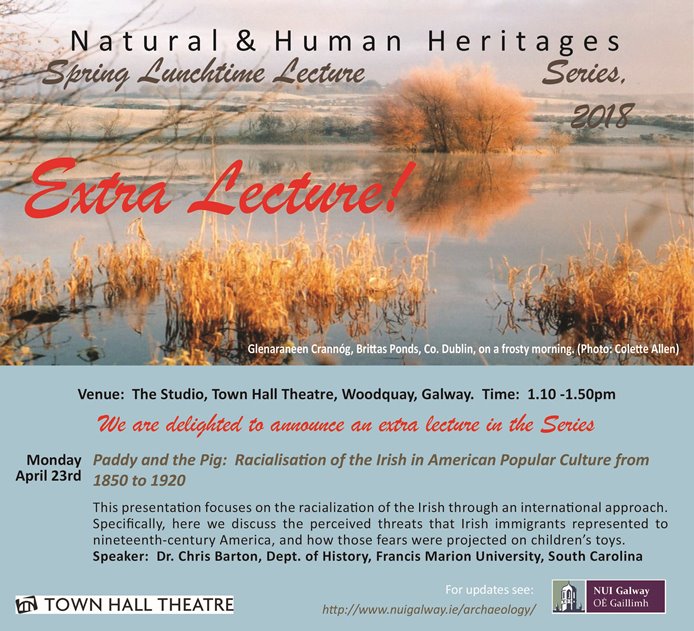
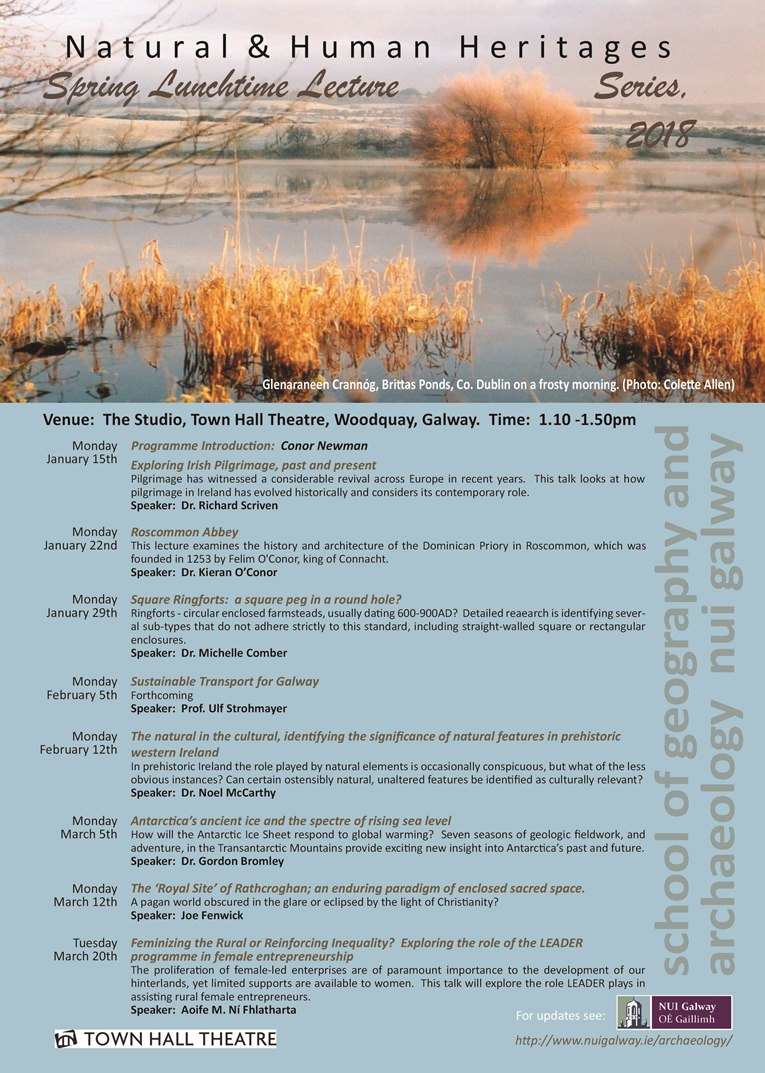
Public Lunchtime Lectures
Spring Lunchtime Lecture Series 2017 (Town Hall Theatre, Galway).
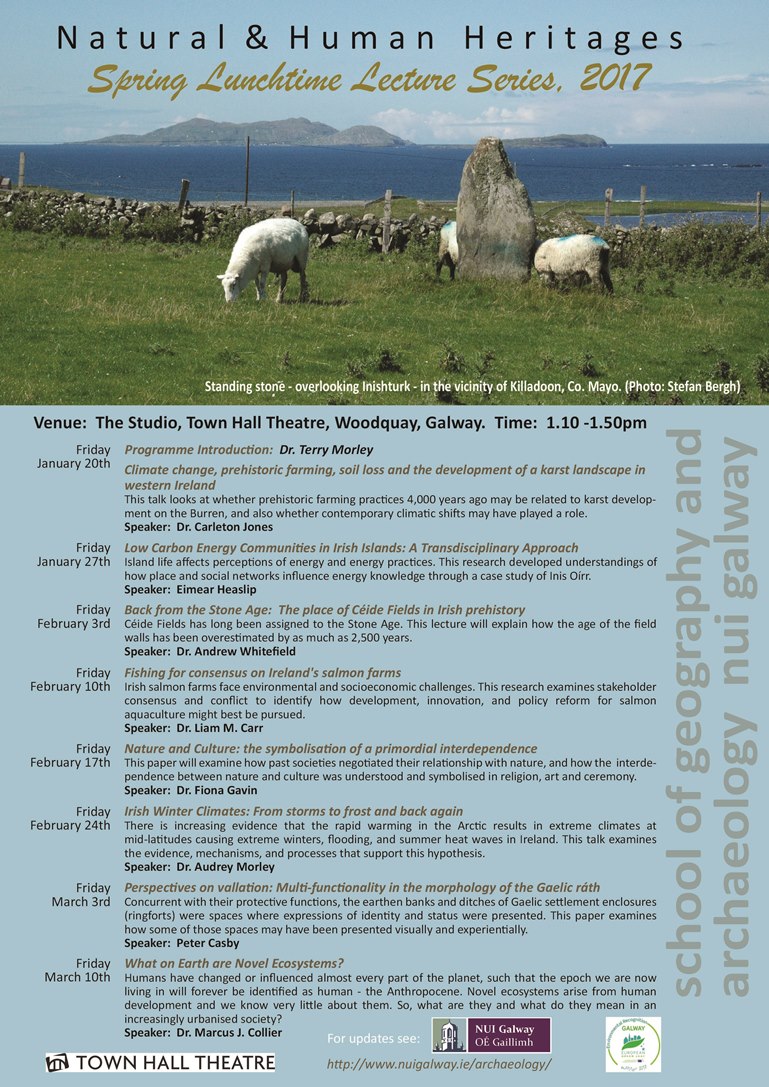
Click here for a dpf version of the Spring Lunchtime Lecture Series in the Town Hall Theatre 2017
Some Archaeology Society Events for 2017
11 Jan - Socs Day Part 2, 10 am - 5 pm, Aras Na MacLeinn
14 Jan - Field trip to Slieve Aughty, leaving the quad at 10, back by 6
16 Jan - Triche Cét Lecture by Dr. Paul MacCotter, 7 pm, AC216
23 Jan - Cards Against Archaeology! 7 pm, AC216
30 Jan - Lecture by Dr. Michelle Comber - Caherconnell excavations, 7 pm, AC216
6 Feb - Archery Workshop, 7 pm, location tbd
13 Feb - Llangorse, a Viking Crannog - Lecture by Dr. Alan Lane, 7 pm AC216
20 Feb - Wales Info Night, 7 pm, AC216
27 Feb - Corrib Log Boats Lecture by Dr. Karl Brady - 7 pm, AC216
7 Mar (TUESDAY!!) - Gold Filigree Lecture by Niamh Whitfield, 7 pm, location tbd
13 Mar - Mystery Event - watch this space for details! 7 pm, AC216
20 Mar - Film night, TBD, 7 pm, AC216
27 Mar - AGM, 7 pm, AC216
10 Apr - 14 Apr - Wales Field Trip, location, erm, Wales
Further informal discussion of lectures at Sliding Rock, unless otherwise noted.
Got questions? Got suggestions? archsoc@socs.nuigalway.ie, www.facebook.com/groups/NUIGArchSoc
Dr Mags Mannion to present a paper at the 8th International Congress of the Association Française pour l’Archéologie du Verre (AFAV)
Dr Mags Mannion will present a paper on her research on glass beads at the 8th International Congress of the Association Française pour l’Archéologie du Verre (AFAV). Mags together with leading academics in the field of glass studies will present papers in English and French on the theme of GLASS IN WESTERN EUROPE AD 700-1600. Her paper will explore the variety of imported beads current in early medieval Ireland and discuss the appreciation of Anglo-Saxon, Scandinavian and Continental glass beads by the native population and also their adoption and incorporation in the maintenance of individual status and authority.
The AFAV, French Association for Glass Archaeology was established in 1985, it is devoted to the promotion and study of ancient glass (from Antiquity to the Modern era) and dissemination of this research. The association organises a triennial international conference on a specific themes and the publication of the proceedings of each conference.
The conference will take place from the 5-7 December 2016 in Besançon (France). The conference is organised by the AFAV together with the Department of Historical Heritage of Besançon and the city department of preventive archaeology, the Maison des Sciences de l’Homme et de l’Environnement C. N. Ledoux and the laboratory Chrono-Environnement.
Click here to view Archaeology Society news and events throuthout 2016 and 2017
Spring Lunchtime Lecture Series 2016
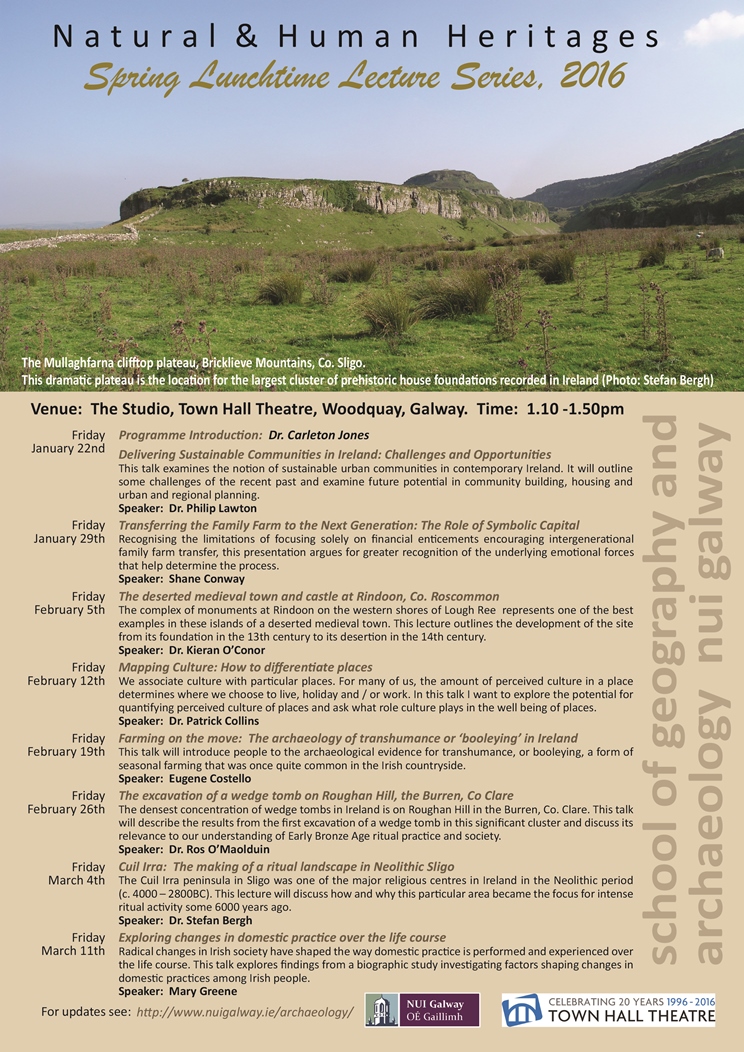
Book Launch: 15 December 2015
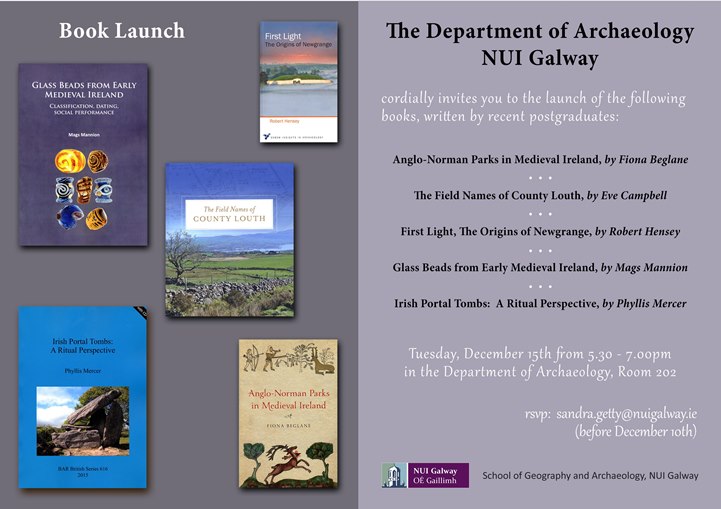
Spring Lunchtime Lecture Series, 2015: Natual and Human Heritages (Vodcasts)
Early Medieval Royalty to Gaelic Nobility - Excavations at Caherconnell Cashel, Co. Clare.
Caherconnell cashel was a high-status dwelling constructed around the 10th century AD, and occupied until the start of the 17th century. This talk explores its story and wider significance.
